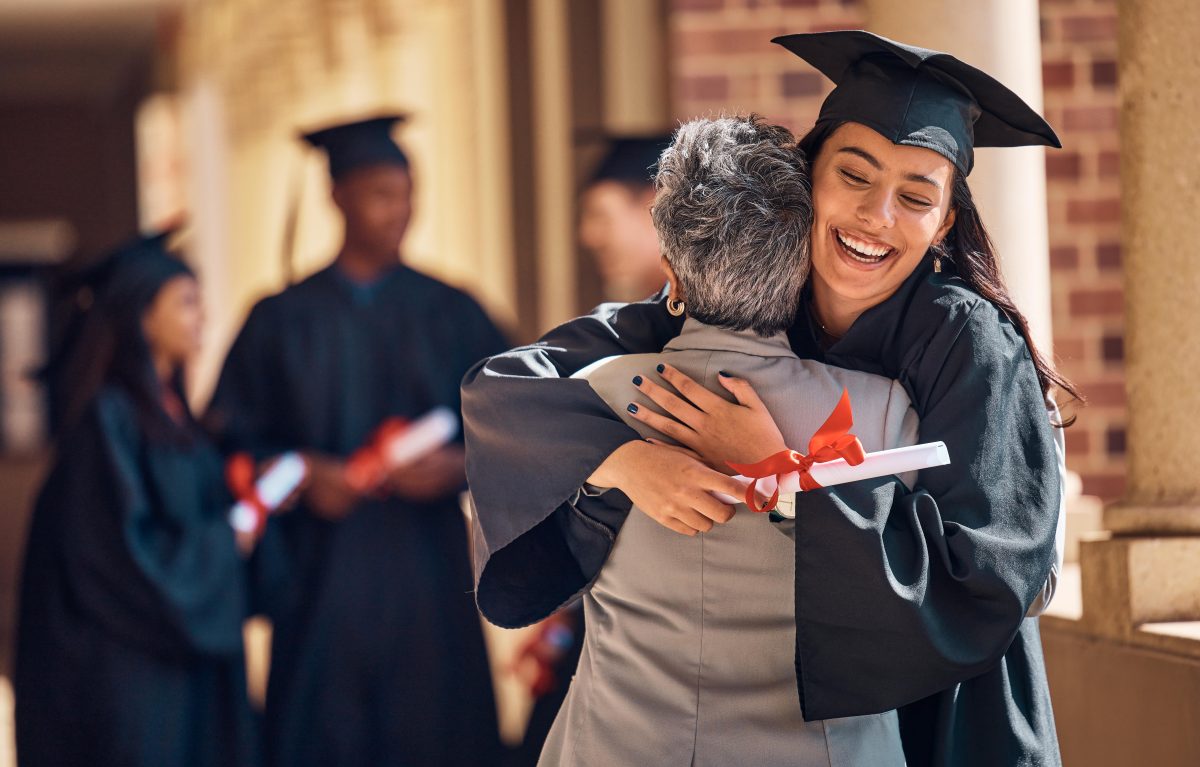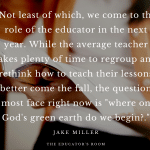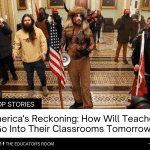Overview:
Seniors who entered high school as virtual students are now graduating. What did we learn from them and their experiences?
“Ms Lamons, do you remember meeting me online? Honestly, that whole year is a bit of a blur.”
It just hit me. I met my incoming seniors for the 2023-2024 school year for the first time online. I met them behind the infamous Black Square Boxes. I engaged with them for an entire school year in their bedrooms, in quiet corners of their homes, and even during breaks on their jobs before ever sharing physical educational space with them. I navigated the virtual realms with anxiety, uncertainty, and ambiguity, knowing one day, I would get to meet my students in person and work through these emotions together.
And now they are seniors.
“What happened [during the pandemic] to schools and families was devastating and electrifying, thought-provoking and quieting, unifying and isolating.” – (USA Today)
It was devastating in the lives that were lost as well as turned upside down by traumatic physical, mental, and financial turmoil.
Electrifying in the technology we were forced to learn overnight, the creativity we tapped into as we tried to bring classroom ideas to virtual realms, and overall excitement at the idea of having time actually to take time to hone our crafts.
Thought-provoking in the increased focus on prioritizing family, mental health, and finally learning to see each others’ humanity.
Quieting in the obvious sense of the quiet of virtual classrooms, but also quieting in being forced to find ways to learn to explore and eventually embrace the quiet of online education. Could we be as effective in virtual learning without the chatter, buzz, and verbal engagement of a lively classroom?
Unifying in the sense that we were all in this new reality, together. The unifying aspect of going through such a tumultuous time was truly a once-in-a-lifetime experience.
And finally, isolating. This one was personally the scariest for me. I worried about those students who did not have much family support. I worried about those students who locked themselves in their rooms the majority of the days and nights, sinking into deeper self-isolation. I worried about not being able to give hugs to the students who I knew needed one the most.
And now they are seniors.
These seniors are the ones I met as freshmen during COVID-19. They were so much more than the typical wide-eyed freshmen who were navigating high school life for the first time. Ninth graders who had finished middle school online and were now tasked with entering the already scary new world of high school in an even more unnerving online learning environment. They were in their kitchens, in rooms with siblings, in backyards, and some in break rooms at work during our class times. Some were caring for their younger siblings or elderly grandparents. While others were preparing meals for their families. Then there were even some struggling to hear lessons over extremely loud and chaotic households. I remember thinking that once we made it through this pandemic, these would turn out to be some of the strongest individuals I have ever taught.
And now they are seniors.
During pandemic teaching, we strived to focus on how much we were able to learn in spite of the circumstances that were dealt to us: empathy, resilience, and perseverance. I learned the true meaning of empathy. It was more than understanding and sharing feelings. We learned to have grace, be flexible, and come up with creative ways to establish a much-needed rapport with both students and parents. It was about looking deeper to find ways for my students and I to develop connections that would help us grow into a type of shared empathy. This would guide the deep relationships we needed to have to get through this together.
And now they are seniors.
In the same way, our shared resilience was more than solely recovering and adjusting to our new normal. It was about looking deeper to ensure that we took the lessons learned and applied them to other aspects of our lives.
- Could we be resilient with our love for flawed family members?
- Could we be resilient in maintaining important friendships while simultaneously establishing and holding clear boundaries?
- Could we be resilient on not only setting but achieving goals for our personal and professional lives?
These questions about resilience are ones students, parents, and educators all needed to explore.
And now they are seniors.
Perseverance is the one word often used when describing the courage in the face of adversity this generation of seniors had to obtain to get to this point in their high school careers. I am reminded of the Bible scripture that described a similar perseverance.
“Therefore, my beloved brethren, be ye stedfast, unmoveable, always abounding in the work of the Lord, forasmuch as ye know that your labor is not in vain…” (1 Corinthians 15:58 KJV)
And now they are seniors.
Stedfast, unmoveable, always abounding, and their labor was definitely not in vain. The truth of the matter is that we are all seniors graduating with the class of 2024. We laughed, we cried, we grieved, we rejoiced, and most of all, we learned together. They were thirteen and fourteen year old deers in headlights, as were many educators who were thrown into this unchartered territory. Four years later, we have come so far, grown so much, and gone through something no other generation of students and educators can relate to.
I’d love to say that if we could survive that experience, then we can survive anything, but that isn’t the nature of this crazy world we call education, is it? But having survived the global pandemic of 2020, it sure makes me think that we all have a lot more weapons, armor, and confidence in the fact that we are much better prepared to tackle whatever the world decides to throw at us next.
Of course, if it could wait until after I retired, I’d be much obliged.






